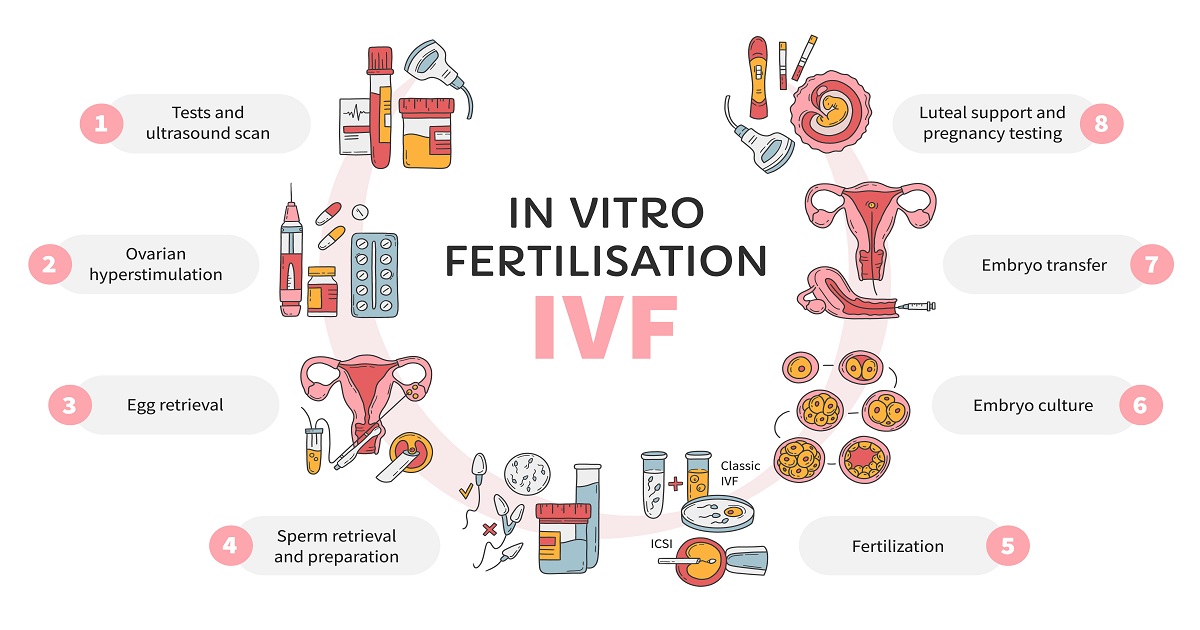There are many reasons behind infertility among couples. The way of living, eating habits, alcohol consumption, stress, hormonal issues, PCOS, etc., can affect the fertility of a person. Despite all these issues, it doesn’t mean that couples cannot celebrate the joy of parenthood. IVF treatment is nothing sort of a blessing for infertile couples. This is one of the fertility procedures with the highest success ratings.
However, there is a certain way to complete the IVF treatment. One cannot be lenient while undergoing IVF treatment. Otherwise, it can lead to disheartening and unsuccessful IVF treatment. There are different stages involved in an IVF treatment which every couple has to go through. A reliable and cheap IVF treatment in Punjab will help every couple to undergo every IVF stage with precision and care.
In-Vitro Fertilisation’s 5 Stages
IVF treatment is a slightly complex, daunting, and emotional journey. Couples undergoing this treatment often get tired and mess up the different stages. However, understanding the importance of every stage can benefit the couple and help them demystify the entire experience and every IVF stage.
-
Medication and trigger shot
This is the initial stage or the beginning of the IVF treatment. It starts with the prescription of fertility medicines which helps in stimulating the ovaries to generate eggs. The medicines involve follicle-stimulating hormone as well as luteinizing hormone. Also, the dosage as well as duration of the medicines are tailored according to every couple and their fertility report. Every IVF specialist targets around 10-15 eggs in this period.
After reaching the optimal stage of egg development, preparation of trigger shot gets started. For final egg maturation, human chorionic gonadotropin is given to a person. This is done to prepare them for retrieval. Later, the same hormone is involved to know the hCG’s blood level and complete the pregnancy testing.
-
Egg retrieval and collection of sperms
This is the second stage of the IVF treatment. This is done around 36 hours after the trigger shot. This is slightly invasive and is performed under anaesthesia. The stage involves inserting a needle into the ovaries to aspirate the fluid as well as eggs. The number of follicles decides the chances of an IVF pregnancy. Also, the follicles in the ovary are checked via the Anti Mullerian Hormone test.
Similarly, a sperm sample is grabbed from the male partner and in some cases a sperm donor. It is then processed, cleaned, as well as prepared to complete the fertilisation process. In most cases, consent of a sperm donor is taken to complete the process.
-
Fertilisation and embryo culture
This is the third stage, in which retrieved eggs are fertilised with the sperm. The process is done in a lab using traditional insemination or ICSI, which is intracytoplasmic sperm injection. However, ICSI is involved when there is male infertility or previous IVF pregnancy failure.
After the fertilisation process, the embryos get cultured in an incubator. This is done to promote their development in controlled conditions. When a mature as well as fertilised egg gets ready for implantation, it is known as blastocyst. However, out of 10 eggs around 3 eggs reach the level of blastocyst. A complete embryo monitoring is performed to enhance the growth and quality.
-
Embryo transfer and a brief period of wait
The fourth stage involves embryo transfer. This is done after 3-5 days of fertilisation. The process involves the insertion of a speculum into the vagina. A thin catheter involving the embryo is then taken into the uterus. The embryo transfer step is painless and there is no involvement of sedation in it.
The total embryos transfer depends on different factors like a woman’s age, IVF history, quality of embryo, etc. Also, if there are any top-notch embryos left then they can be cryopreserved for later use.
-
IVF pregnancy test
After the entire trusted and cheap IVF treatment in Punjab is done, a couple undergo a pregnancy test. This is done around 10-15 days after the embryo test. This last stage determines whether the IVF cycle was successfully done or not. Also, this is done by measuring the level of hCG in the woman’s urine or blood. However, couples with unsuccessful IVF cycle and again go through the process to achieve IVF pregnancy.
The accuracy level of blood tests and urine tests in IVF treatment
IVF treatment is different from PCOS treatment in Ludhiana. To ensure a successful IVF pregnancy, there is involvement of blood tests and urine tests. However, when it comes to their accuracy level, both are reliable. However, they are meant for different things and timings during the IVF treatment.
Blood tests are slightly more accurate as compared to others, especially during the early pregnancy stages. The blood test can easily detect low levels of hCG or human chorionic gonadotropin. Also, it can be done after 8-10 days after ovulation whereas urine tests detect it after 12-14 days after ovulation. Moreover, blood tests are known to be 99% accurate.
When it comes to urine tests, they are convenient, affordable, and easy to do at home. The urine test kits are available easily to confirm an IVF pregnancy. But sometimes they can give false hopes by detecting wrong hCG levels. This is why it is suggested to repeat urine tests and even consult a doctor to know the certainty of the IVF pregnancy.
Conclusion
Many couples are undergoing IVF treatments due to the high rate of infertility. This is the best treatment to achieve pregnancy and enjoy parenthood. However, IVF treatment is different from PCOS treatment in Ludhiana and involves different stages. The above-mentioned information about every stage of an IVF treatment will help couples to be physically, mentally, as well as financially prepared. It can be daunting and tiresome, but it requires the precision and guidance of a professional and renowned IVF doctor. Also, when it comes to detecting IVF pregnancy, urine tests and blood tests are opted for. However, blood tests offer more accurate results than urine tests. So, undergoing IVF treatment is easy and can be done by any infertile couple.




